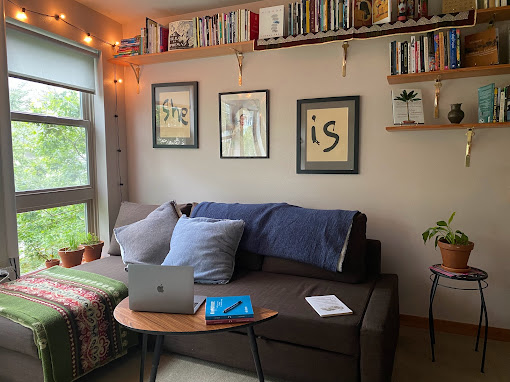To speak about my writing day, I have to speak about the circumstances in which my writing day exists, a “day” which is mere hours eked out between examining patients in the cardiology clinic, grocery shopping, and simmering a pot of lentils for the week while washing the bath towels. I cannot think of poetry when I am folding laundry because I am worrying about my debts, and I cannot think of poetry when I am commuting to work because I am preparing myself for when a coworker uses that particular coded word for a group of people again—my people—and how can I respond in a way that does not inflame him into making the office less bearable, and if I am the only person who ever responds and thus inflames him, should I not just remain silent to better disappear into my workplace?
I say this to make clear how art—in particular the lyrical form of communication I have devoted my life to—exists in the cracks of or, more precisely, in conflict with a capitalist system, a system that requires our time in the form of labor in order to produce profit for those who do not labor. Such labor includes emotional labor and often borders physical harm, as with the slow degradation of elbows to arthritis and wrists to carpal tunnel. Healthcare, at the level of the boardroom, does not exist outside of this system. Poetry also exists within this system of capital, although what does not fit into it is poetry’s slow process, the anti-grammatical observation of time passing and one’s place within that movement.
I pour three shots of espresso from the stovetop’s cafetera. I read from one of the three books that I am partway through, placed on different tables in the apartment. I know I must return to work tomorrow but I also know that creativity requires wasted time, by which I mean time that does not produce money. My best moments of writing are long, silent walks through my neighborhood during which I might crouch low and try to distinguish different mosses and lichens growing through cracks in the stone path while I listen to wind rushing in trees, crow calls and passing cars so that I can locate myself within this environment. Once I have located myself, I spend a certain time in stillness until I can begin to formulate words into a pattern, which may sometimes be in the form of a subject and predicate or sometimes a feeling lacking syntax.
To continue writing requires some justification of why. If I find myself located within lichens, trees, crow calls and people traveling somewhere important to them, my words only have as much value as understanding themselves to be a part of that living network. I don’t know what truth is unless it is my relationship to my environment nor do I know what beauty is unless it is the beauty of revolution. Can I use my voice to harmonize with my natural world or disrupt what may cause it harm?
It is two weeks later now. The first half of this essay was written during a partial sick day, which was the first time in a long time that I had the opportunity to sit down and write. Every day since that sick day, I came home from work and saw the words “FINISH ESSAY” written on the chalkboard in my kitchen and thought, “maybe this weekend.” After a weekend of being on call, a week of catching up on chores, and a weekend of feeling the wild, free, sleep-deprived chaos of rare free-time, I am sitting on my living room sofa, which is my home office, so that I can finish my thought about my writing day. What was my thought?
Finishing a poem may take months or years. Why does it take so long? One reason may be that the labor our current economic system requires of us and the labor required to survive the white supremacy of that system in part exist to disrupt time, which is our freedom of thought. Suppressing free thought is necessary for those of us caught within these systems to allow them to continue. So, I repeat the process of silence, locating myself in the natural world, and stillness leading to language. With enough time in between editing each piece of writing I can return to it after forgetting it and see it as new. Eventually, I can complete a piece of writing that understands myself in connection to my environment. Once it is shared with friends and edited sufficiently, I may submit it to journals for publication or prizes that would give me some small, art-world feelings of importance. While I enjoy the brief feeling of visibility that comes with publication, that feeling is not the poetry that gives me meaning, nor does it connect me to the network of lichens, trees, crows and people that I locate myself in. My truest writing day may not be a work period nor even planetary rotation, but a lyrical unit. The poetry I strive for creates time.
Paul Hlava Ceballos is the author of banana [ ], winner of the 2021 AWP Donald Hall Prize for Poetry, chosen by Ilya Kaminsky, forthcoming from the University of Pittsburgh Press.
His collaborative chapbook, Banana [ ] / we pilot the blood (3rd Thing Press, 2021), shares pages with Quenton Baker, Dr. Christina Sharpe, and Torkwase Dyson.
He has received fellowships from CantoMundo, Artist Trust, and the Poets House. His work has been published in POETRY, Pleiades, Triquarterly, Poetry Northwest, BOMB, and Narrative Magazine, among other journals and newspapers.
He currently lives in Seattle, where he practices echocardiography.

No comments:
Post a Comment